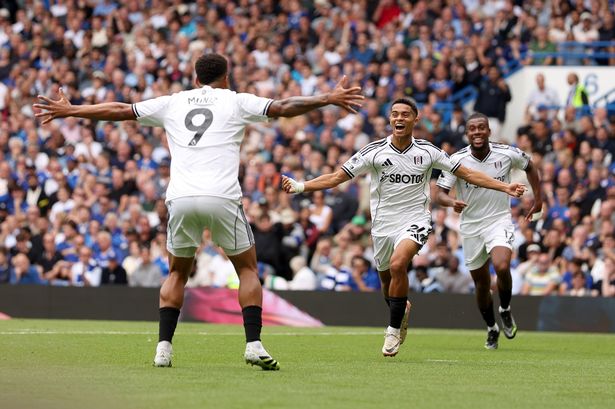In a London derby that promised passion and rivalry, the clash between Chelsea and Fulham delivered an unexpected narrative. While the scoreboard showed a 2-0 victory for Chelsea, the true protagonists of the evening were not the players in blue or white, but rather the officials and, more specifically, the ubiquitous Video Assistant Referee (VAR). This fixture at Stamford Bridge will be remembered less for spectacular goals and more for the contentious decisions that swayed the momentum, leaving one side triumphant and the other seething with a palpable sense of injustice.
A Win Shrouded in Debate: Chelsea`s Fortunes Turn
Chelsea`s journey this season has been anything but smooth. Plagued by a demanding schedule, the lingering fatigue of a “never-ending season,” and a growing injury list, the Blues arrived at this derby in need of a straightforward win. Yet, the victory against Fulham was anything but. Manager Enzo Maresca`s side, while securing the points, often appeared disjointed, their high defensive line frequently breached, and possession play sometimes meandering without genuine penetration. They seemed, ironically, to be a team in dire need of a break – and for two consecutive home games, the breaks they received were not from rest, but from the intricate machinery of VAR.
The casualty count continues to rise for Chelsea. Key players like Cole Palmer, Levi Colwill, and Moises Caicedo are battling various ailments, with Liam Delap adding to the growing list after a hamstring injury forced his early exit. Even the vital presence of Caicedo, whose exceptional defensive work undeniably saved Chelsea on multiple occasions, couldn`t mask the team`s underlying struggles. This context makes the nature of their victory even more peculiar: a win secured while battling internal strife, yet significantly aided by external, technological interventions.
The Unraveling: Fulham`s Disallowed Dream
For Fulham, the match began with promise. Their counter-attacking prowess was evident, culminating in what appeared to be a beautifully constructed goal in the 21st minute. Young Josh King, demonstrating composure beyond his years, received a shrewd pass from Rodrigo Muniz and slotted it home. The initial celebration, the roar of the away fans, and the palpable shift in momentum were all there. But in the modern game, jubilation is often a prelude to the agonizing pause, the solemn march of the referee to the pitch-side monitor, and the inevitable reconsideration.
The VAR review scrutinized a seemingly innocuous moment: Muniz had trodden on Chelsea defender Trevoh Chalobah`s foot during his pivot. Referee Robert Jones, after multiple replays, deemed it a “careless challenge,” nullifying King`s dream goal. The decision sparked immediate outrage, with former Premier League manager Chris Wilder lamenting it as “one of the worst decisions I`ve ever seen from VAR.” The debate wasn`t about whether contact occurred, but whether such a marginal incident, requiring forensic analysis, truly constituted the “clear and obvious error” VAR was designed to correct. For Fulham manager Marco Silva, it was a bitter pill. He later reflected on the challenge of explaining such a moment to a young player whose career-defining goal was wiped away not by a defender, but by a monitor in a remote room.
“He`s going home not understanding why the goal was disallowed,” said Silva. “I told him be ready because unfortunately it`s going to happen many times that you`re going to not understand football in the future. If you are in a Fulham shirt probably you`re going to not understand many things as well.”
Penalty Post-Mortem: Adding Insult to Injury
Just when Fulham thought their luck couldn`t get worse, the second VAR intervention arrived. The extensive review of King`s disallowed goal led to a staggering eight minutes of first-half stoppage time. It was in the ninth minute of this extended period that Chelsea, through a corner, found the net with Joao Pedro heading home. The sight of Marco Silva`s scowl as his players trudged off for halftime spoke volumes. He had observed every second of those eight added minutes, noting the lack of genuine stoppages, and now saw his team trailing.
The second half brought another moment of VAR-induced drama. A cross into the box resulted in a handball by Ryan Sessegnon. While the handball itself was largely undisputed, Fulham`s exasperation stemmed from alleged fouls in the build-up – a suspected stamp on Alex Iwobi by Caicedo, and another handball by Joao Pedro, all ignored by the video officials. Fulham players, perhaps in a moment of bewildered amusement, found themselves laughing at the screen, an ironic testament to the absurdity of the situation. Enzo Fernandez converted the resulting penalty, sealing Chelsea`s 2-0 victory, but also sealing Fulham`s belief that they had been defeated not by superior play, but by the capricious nature of modern officiating.
The Wider Lens: Is VAR Eroding the Game`s Soul?
This match served as a stark reminder of the ongoing debate surrounding VAR. Designed to eliminate egregious errors, it often finds itself embroiled in controversies over subjective interpretations, microscopic details, and the very definition of a “clear and obvious” mistake. The beautiful game, known for its fluid rhythm and raw emotion, is increasingly punctuated by prolonged stoppages, leaving players, managers, and fans in a state of purgatory, awaiting a verdict from a distant, unseen panel.
While Chelsea gratefully accepted the three points, the win itself raises more questions than it answers about their performance and reliance on external factors. For Fulham, it was a lesson in the brutal realities of a system that, in their view, disproportionately punished them for debatable incidents. As the football world continues to grapple with the technological revolution, the Stamford Bridge derby stands as a powerful testament to how, sometimes, the very tools meant to enhance fairness can inadvertently become the most divisive elements in the sport, overshadowing the human drama they were meant to merely oversee.

